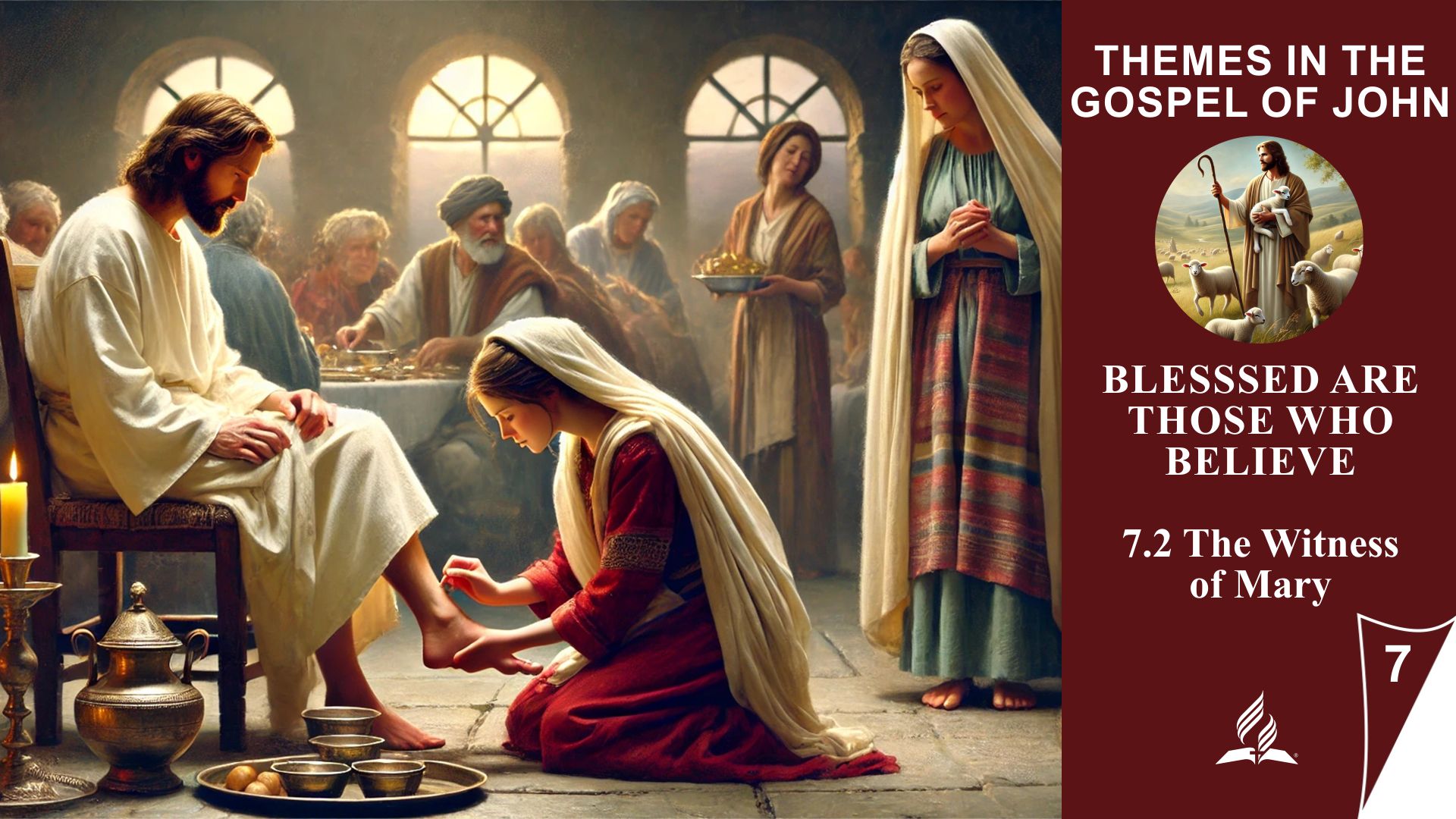


7.2 The Witness of Mary
Mary’s Precious Gift as an Expression of Faith
What was the significance of Mary’s behavior here? In what way was this a testimony to who Jesus really was? John 12:1–3
Mary’s action in Simon’s house was a profoundly meaningful testimony of her gratitude and faith in Jesus. By using the precious ointment, she demonstrated that she recognized the uniqueness of Jesus as the Savior and the coming King. Her sacrifice was not merely a material gift but a demonstration of deep devotion and love that went beyond logical considerations. She was willing to sacrifice the most valuable thing she possessed for Jesus, reflecting her faith and understanding of Him as the Messiah.
Mary’s act was a stark contrast to Judas’ reaction. While Judas criticized the gift and hid behind apparent charity, Mary’s action showed pure love and an intuitive understanding that Jesus’ time on earth was limited. Her gift, which filled the entire house with its fragrance, became a testimony that was not hidden. John describes this fragrance as a sign that true faith and genuine devotion inevitably have an impact and can change the atmosphere.
Jesus protected Mary from criticism and honored her action as preparation for His burial. This showed that her devotion had a deeper spiritual meaning that she might not have fully understood herself but acted out of genuine faith and love. Her gesture was not only a loving act but also a prophetic testimony that honored Jesus as the true Savior and strengthened Him in the last days of His life. Mary’s action teaches us that true love and devotion to Jesus often go unnoticed or may even be misunderstood by others, but they are infinitely precious and meaningful in God’s eyes.
Jesus knew what was in the hearts of Mary and Judas. He also knows what is in your heart. What should this truth tell us about needing Christ as our righteousness, who transforms and also covers us?
The fact that Jesus knew what was in the hearts of Mary and Judas shows us that He also knows the deepest motivations, struggles, and longings in our hearts. This realization makes it clear that we need Christ as our righteousness because our own hearts are often imperfect, wounded, and fallible. Although we may outwardly show good intentions and deeds, Jesus sees the uncertainties, doubts, and tendencies that repeatedly lead us to make wrong decisions or rely on our own righteousness.
We need Christ not only to change us externally but also to transform our hearts and heal us from within. His righteousness is not merely a covering for our imperfections but also a power that renews us internally and makes us more like Him. This means that Jesus not only forgives us and covers us with His righteousness but also wants to shape our innermost inclinations and character traits so that we live in accordance with His will.
This truth calls us to be humble and recognize that we cannot be perfect by our own strength. Only through His grace and righteousness can we lead a life pleasing to God. Christ as our righteousness reminds us that we do not need to be perfect to be accepted, but that He Himself is our righteousness—and that this righteousness simultaneously changes us, making us increasingly like Him.
The story of Mary and her precious gift reminds us how our faith can be expressed in everyday life. Mary’s willingness to sacrifice the most valuable thing for Jesus shows that true faith is not only in words but becomes visible through bold and perhaps unexpected actions. Mary’s faith was so deep that it led her to honor Jesus in a way that seemed irrational or wasteful to others. This invites us to ask ourselves: Where do we invest our most valuable—whether it be time, love, or resources—as an expression of our gratitude and love for God?

In our daily lives, Mary’s example shows us that true devotion often means enduring criticism or misunderstandings from others because the value of our faith sacrifice is often fully understood only by God. Just as the house was filled with the fragrance of the oil, our acts of faith—whether big or small—can change the atmosphere around us and serve as a testimony of love and gratitude.
Mary’s action also indicates that our faith can sometimes be prophetic, revealing a deeper picture of God’s work in the world, even if we do not fully comprehend it ourselves. In a time that often emphasizes material values and self-interest, Mary’s faith invites us to consider the value of our devotion to Christ, even if it sets us apart from others. It is a living faith that is willing to make sacrifices and honor God because we know that He sees and understands our hearts.
In everyday life, this story reminds us that Jesus knows the needs, hopes, and weaknesses of our hearts and transforms us through His grace. Our faith in Him allows us to bring our fears and imperfections before Him while trusting that He heals our hearts, forgives us, and enables us to become more like Him.

True faith often manifests in silent sacrifices that only God fully understands and values.
(Visited 31 times, 1 visits today)




















